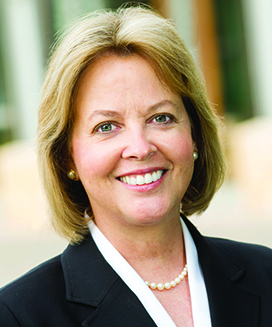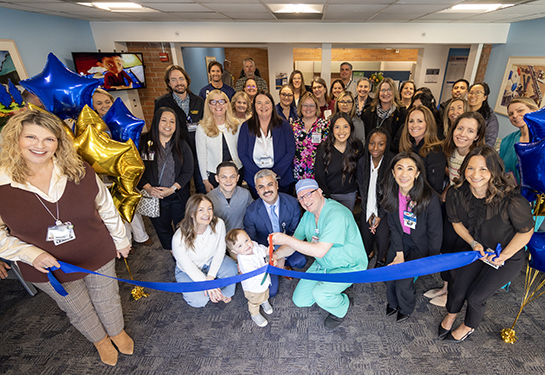Long-standing genomic medicine partnership expands specialty care for children in region
When Katherine Rauen was recruited by the UC Davis MIND Institute seven years ago, one of the first things she did was pay a visit to Dignity Health Mercy San Juan Medical Center in Carmichael. The MIND Institute’s Genomic Medicine Division, in the Department of Pediatrics, had a relationship with Dignity Health, offering in-person consultations for pediatric patients, and Rauen, a physician-scientist and geneticist, wanted to strengthen it.

“I really wanted to develop a telemedicine relationship, what I call TeleGenomics,” said Rauen, who is now an emeritus professor, and was the chief of the Genomic Medicine Division for many years. “I visited the neonatal intensive care unit (NICU) and met firsthand with an incredible team of neonatologists and saw that they had amazing telemedicine capabilities because Dignity was a very early adopter of this up and coming technology. They have state-of-the-art, powerful, capable telemedicine robots.”
Now, the two health systems have a round-the-clock genomic medicine partnership. The robots are equipped with high-quality cameras that allow MIND Institute specialists to provide consultations for Dignity Health patients at Mercy San Juan and Methodist Hospital of Sacramento.
“It’s a robust working relationship, providing genomic medicine consultation, and we’re available to them 24/7,” said Rauen. “We’ve got phenomenal, well-trained physicians and physician-scientists on our faculty here at the MIND Institute and we have exceptionally trained genetic counselors -- they have access to all of this.”
— Katherine Rauen
What is TeleGenomics?
Throughout the pandemic, telemedicine has become more common, but when the genomic medicine partnership was established, it was less frequently used.
“Many people had doubts at the time that we would be able to do a thorough physical examination for genomics, but the telemedicine robot is so powerful, I could see moles on a newborn’s skin, I could see tiny tufts of hair. The imagery is powerful.”
The consultations are requested for a variety of reasons. For example, when a child born at Methodist Hospital or Mercy San Juan has multiple congenital anomalies, such as heart or skeletal defects, isn’t eating properly, or has features that are consistent with Down syndrome.

Katherine Rauen, professor emeritus, Department of Pediatrics and former Division of Genomic Medicine chief
“Instead of having to transfer the child to UC Davis Health for genomic medicine input, they just give us a call through TeleGenomics and we go to them virtually,” Rauen explained.
The bedside nurse assists as needed, and the examination is done almost entirely using the camera.
“We can see skin findings, toenails, creases on the palms and soles and sacral pits [indentations in the skin of the lower back]. It works out very, very well,” Rauen said.
The genomic medicine specialist makes recommendations and shares them with the family and Dignity Health physician, and every patient receives follow-up care.
“Whether you’re in-patient at UC Davis, or you’re at Methodist or Mercy San Juan being seen through telemedicine, there is an automatic follow-up to see how the child’s doing and to follow up on genetic testing,” Rauen noted.
Regional excellence
Rauen is passionate about the partnership between UC Davis Health and Dignity Health.
“We’re a major metropolitan area. This standard of care should be an expectation for our families. It’s so important to build community bridges, and this is our job. Medicine transcends race, creed, color, religion. We have taken an oath to place people’s health above all and we take this very seriously.”
Genomic Medicine at UC Davis Health
The Genomic Medicine Division specializes in the evaluation and treatment of genetic disorders and offers whole genome sequences. The division includes a number of different clinics, including:
• Genomic Medicine - General Clinic
• NF/Ras Pathway Genomic Medicine Clinic
• Metabolic Clinic
• Lysosomal Storage Disorders Clinic
• Neurogenomics Clinic
• Ocular Precision Genomics Clinic
• TeleGenomics Clinic
Rauen, who worked at UC San Francisco for 20 years before coming to the MIND Institute, has a saying about the kind of care patients in the region should receive: “My mantra, having come from UCSF, is that not one of our patients should have to cross a bridge to get exceptional care.” she said.
“We really appreciate the service that UC Davis Health Genomic Medicine provides at Mercy San Juan. When we have a baby who needs a genetic evaluation, we are able to readily access the genomic physicians and counselors and discuss our concerns,” said Carolyn Getman, medical director, Neonatal Intensive Care Unit, Dignity Health Mercy San Juan Medical Center. “The ability to use telemedicine for the consultation facilitates a rapid evaluation and allows the geneticist to discuss a baby's care with the parents at the bedside in a timely manner. We are grateful for this collaboration.”
The UC Davis MIND Institute in Sacramento, Calif. is a unique, interdisciplinary research, clinical, and education center committed to deepening scientific understanding of autism and other neurodevelopmental conditions. It is a highly collaborative center, bringing together families, researchers, clinicians, community leaders and volunteers with the common goal of developing more personalized, equitable, and scientifically proven systems of support and intervention. The institute has major research efforts in autism, fragile X syndrome, chromosome 22q11.2 deletion syndrome, attention-deficit/hyperactivity disorder (ADHD) and Down syndrome. More information about the institute and its Distinguished Lecturer Series, including previous presentations in this series, is available on the Web at mindinstitute.ucdavis.edu.



